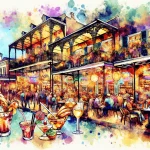Situated in Eastern New Orleans, Pines Village stands as a dynamic community that embodies the spirit of the city. This area, with its unique blend of history, traditions, and modern influences, offers a captivating glimpse into the diverse tapestry that makes New Orleans remarkable.
In This Article
TL;DR
- Pines Village is a culturally significant neighborhood in Eastern New Orleans, known for its rich history, vibrant community, and unique traditions.
- The area boasts a diverse range of architectural styles, from shotgun houses to Creole cottages, reflecting its multicultural heritage.
- Pines Village hosts various annual festivals, art galleries, music venues, and culinary delights that celebrate the city’s cultural legacy.
Historical Context of Pines Village
Pines Village traces its origins back to the early 19th century when it was a rural settlement on the outskirts of New Orleans. As the city expanded, the area became a melting pot of cultures, with immigrants from various backgrounds settling in the neighborhood. This diversity shaped the unique character of Pines Village, blending influences from French, Spanish, African, and Native American traditions.
Over the years, Pines Village has endured numerous challenges, including natural disasters and economic hardships. However, the resilience and determination of its residents have ensured that the neighborhood’s cultural heritage remains intact. Historic events, such as the Great Mississippi River Flood of 1927 and Hurricane Katrina in 2005, have left indelible marks on the community, shaping its resilience and strengthening its bonds.
Cultural and Social Fabric
Pines Village is a true reflection of New Orleans’ cultural diversity, with a rich tapestry of ethnicities, religions, and traditions interwoven into its fabric. The neighborhood’s demographic makeup includes African Americans, Creoles, Cajuns, Vietnamese, and Hispanic communities, each contributing to the area’s vibrant cultural landscape.
Local traditions and festivals are at the heart of Pines Village’s identity. The annual Pines Village Jazz Festival, held every spring, celebrates the neighborhood’s deep-rooted connection to the city’s jazz heritage. The festival features local and international musicians, food vendors, and art exhibitions, attracting visitors from around the world.
Community-led initiatives, such as neighborhood watch programs and youth mentorship organizations, foster a strong sense of social cohesion and pride within Pines Village. These efforts have played a crucial role in preserving the area’s unique character and ensuring its continued growth and development.
Architectural and Environmental Features
Pines Village boasts a variety of architectural styles, reflecting its rich cultural heritage. Shotgun houses, Creole cottages, and Victorian-era homes line the streets, each with its own unique charm and character. Notable buildings, such as the Pines Village Community Center and the historic St. Augustine Catholic Church, serve as landmarks and gathering places for the community.
The neighborhood’s layout and public spaces have been carefully designed to integrate natural landscapes into the urban environment. Pines Village Park, a lush green oasis in the heart of the community, offers residents a peaceful retreat and a venue for outdoor events and gatherings.
Economic Dynamics and Local Businesses
Pines Village’s economic landscape is a vibrant tapestry of small businesses and local entrepreneurs. From family-owned restaurants and corner stores to artisanal shops and galleries, the neighborhood is a hub of entrepreneurial spirit and creativity.
Local businesses like Mama’s Creole Kitchen and the Pines Village Pottery Studio have become integral parts of the community, not only providing goods and services but also serving as cultural hubs where residents can gather and celebrate their shared heritage.
Despite economic challenges, Pines Village has remained resilient, with community-driven initiatives and support from local organizations helping to foster a thriving small business ecosystem.
Educational and Community Institutions
Pines Village is home to several educational institutions that play a vital role in shaping the community’s future. The Pines Village Elementary School and the Pines Village Community College offer quality education and vocational training programs, ensuring that residents have access to opportunities for personal and professional growth.
Community centers, such as the Pines Village Neighborhood Center and the Pines Village Youth Center, provide essential services and resources to residents of all ages. These institutions serve as gathering places for social events, educational programs, and community outreach initiatives.
Religious institutions, like the historic St. Augustine Catholic Church and the Pines Village Baptist Church, have been integral to the community’s spiritual and cultural life, offering not only places of worship but also serving as hubs for community engagement and support.
Arts, Music, and Entertainment
Pines Village’s vibrant arts scene is a testament to the neighborhood’s creative spirit. Local galleries, such as the Pines Village Art Collective and the Pines Village Gallery, showcase the works of talented local artists, offering a glimpse into the area’s rich cultural heritage.
The neighborhood’s music heritage is deeply rooted in the city’s jazz and blues traditions. Venues like the Pines Village Jazz Club and the Pines Village Blues Bar have become renowned for their live music performances, attracting both local and international talent.
Entertainment options in Pines Village are abundant, with annual events like the Pines Village Street Fair and the Pines Village Film Festival offering a variety of cultural experiences for residents and visitors alike.
Culinary Scene
Pines Village’s culinary landscape is a reflection of the neighborhood’s diverse cultural influences. From Creole and Cajun cuisine to Vietnamese and Hispanic flavors, the area’s restaurants and food trucks offer a tantalizing array of culinary delights.
Notable chefs and culinary influencers, such as Chef Leah Chase of the renowned Dooky Chase’s Restaurant, have played a pivotal role in shaping the neighborhood’s culinary identity and preserving its rich food traditions.
Food is not just sustenance in Pines Village; it is a means of cultural expression and community gathering. Local events like the Pines Village Crawfish Boil and the Pines Village Gumbo Fest celebrate the area’s culinary heritage, bringing residents together to share in the joy of good food and good company.
Challenges and Future Outlook
Like many urban communities, Pines Village faces challenges related to urban development and cultural preservation. Gentrification and the influx of new residents have raised concerns about maintaining the neighborhood’s unique character and affordability.
However, local leaders and community organizations are actively working to address these challenges through initiatives aimed at sustainable development, affordable housing, and cultural preservation efforts.
The future of Pines Village lies in striking a balance between embracing progress and preserving its rich cultural heritage. With a strong sense of community pride and a commitment to celebrating its diversity, Pines Village is poised to continue thriving as a vibrant and culturally significant neighborhood in the heart of New Orleans.






